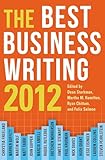The Best Business Writing 2012 / ed. by Martha Hamilton, Ryan Chittum, Felix Salmon, Dean Starkman.
Material type: TextSeries: Columbia Journalism Review BooksPublisher: New York, NY : Columbia University Press, [2012]Copyright date: ©2012Description: 1 online resource (464 p.)Content type:
TextSeries: Columbia Journalism Review BooksPublisher: New York, NY : Columbia University Press, [2012]Copyright date: ©2012Description: 1 online resource (464 p.)Content type: - 9780231160735
- 9780231504331
- 560/.457 21
- QE766 .E93 2002eb
- online - DeGruyter
- Issued also in print.
| Item type | Current library | Call number | URL | Status | Notes | Barcode | |
|---|---|---|---|---|---|---|---|
 eBook
eBook
|
Biblioteca "Angelicum" Pont. Univ. S.Tommaso d'Aquino Nuvola online | online - DeGruyter (Browse shelf(Opens below)) | Online access | Not for loan (Accesso limitato) | Accesso per gli utenti autorizzati / Access for authorized users | (dgr)9780231504331 |
Frontmatter -- Contents -- Introduction -- Acknowledgments -- Part I. Bad Business -- 1. The Dark Lord of Coal Country. Rolling Stone -- 2. Missing Milly Dowler's Voicemail Was Hacked by News of the World. The Guardian -- 3. Phone-Hacking Crisis Shows News Corp Is No Ordinary News Company. The Guardian -- 4. The Bugger, Bugged. The New Statesman -- 5. A Case of Shattered Trust. Milwaukee Journal Sentinel -- Part II. The Financial System and Its Discontents -- 6. The "Subsidy": How a Handful of Merrill Lynch Bankers Helped Blow Up Their Own Firm. ProPublica -- 7. Countrywide Protected Fraudsters by Silencing Whistleblowers, Say Former Employees. iWatch News -- 8. Curse the Geniuses Who Gave Us Bank of America. Bloomberg News -- 9. Is the SEC Covering Up Wall Street Crimes?. Rolling Stone -- 10. In Financial Crisis, No Prosecutions of Top Figures. The New York Times -- Part III. Over There -- 11. Time for Germany to Make Its Fateful Choice. Financial Times -- 12. In Norway, Start-Ups Say Ja to Socialism. Inc. -- Part IV. Politics and Money -- 13. Swiped. The Huffington Post -- 14. Stop Coddling the Super-Rich. The New York Times -- 15. Blame for the Financial Mess Starts with the Corporate Lobby. Washington Post -- 16. Nine Things the Rich Don't Want You to Know About Taxes. Association of Alternative Newsweeklies -- 17. The Hijacked Crisis. The New York Times -- 18. Greenspan, Rubin, and a Roomful of Hypocrites. The Motley Fool -- Part V. The Big Picture -- 19. The Rise of the New Global Elite. The Atlantic -- 20. Can the World Still Feed Itself ?. The Wall Street Journal -- 21. Law School Economics: Ka-Ching!. The New York Times -- 22. When Patents Attack!. This American Life -- 23. The Illusions of Psychiatry. The New York Review of Books -- 24. From Inside Job. Representational Pictures -- Part VI. Corporate Stories -- 25. Inside Pfizer's Palace Coup. Fortune -- 26. It Knows. London Review of Books -- 27. Innovators Don't Ignore Customers. Financial Times -- 28. House Perfect. The New Yorker -- 29. Voting to Hire a Chief Without Meeting Him. The New York Times -- 30. How Ford Became Last Man Standing. Reuters -- 31. What Made Steve Jobs So Great?. Fast Company -- Permissions -- List of Contributors
restricted access online access with authorization star
http://purl.org/coar/access_right/c_16ec
An anthology Malcolm Gladwell has called "riveting and indispensable," The Best Business Writing is a far-ranging survey of business's dynamic relationship with politics, culture, and life. This year's selections include John Markoff (New York Times) on innovations in robot technology and the decline of the factory worker; Evgeny Morozov (New Republic) on the questionable value of the popular TED conference series and the idea industry behind it; Paul Kiel (ProPublica) on the ripple effects of the ongoing foreclosure crisis; and the infamous op-ed by Greg Smith, published in the New York Times, announcing his break with Goldman Sachs over its trading practices and corrupt corporate ethos.Jessica Pressler (New York) delves into the personal and professional rivalry between former spouses and fashion competitors Tory and Christopher Burch. Peter Whoriskey (Washington Post) exposes the human cost of promoting pharmaceuticals for off-label uses. Charles Duhigg and David Barboza (New York Times) investigate Apple's unethical labor practices in China. Max Abelson (Bloomberg) reports on Wall Street's amusing reaction to the diminishing annual bonus. Mina Kimes (Fortune) recounts the grisly story of a company's illegal testing-and misuse-of a medical device for profit, and Jeff Tietz (Rolling Stone) composes one of the most poignant and comprehensive portraits of the financial crisis's dissolution of the American middle class.
Issued also in print.
Mode of access: Internet via World Wide Web.
In English.
Description based on online resource; title from PDF title page (publisher's Web site, viewed 02. Mrz 2022)


